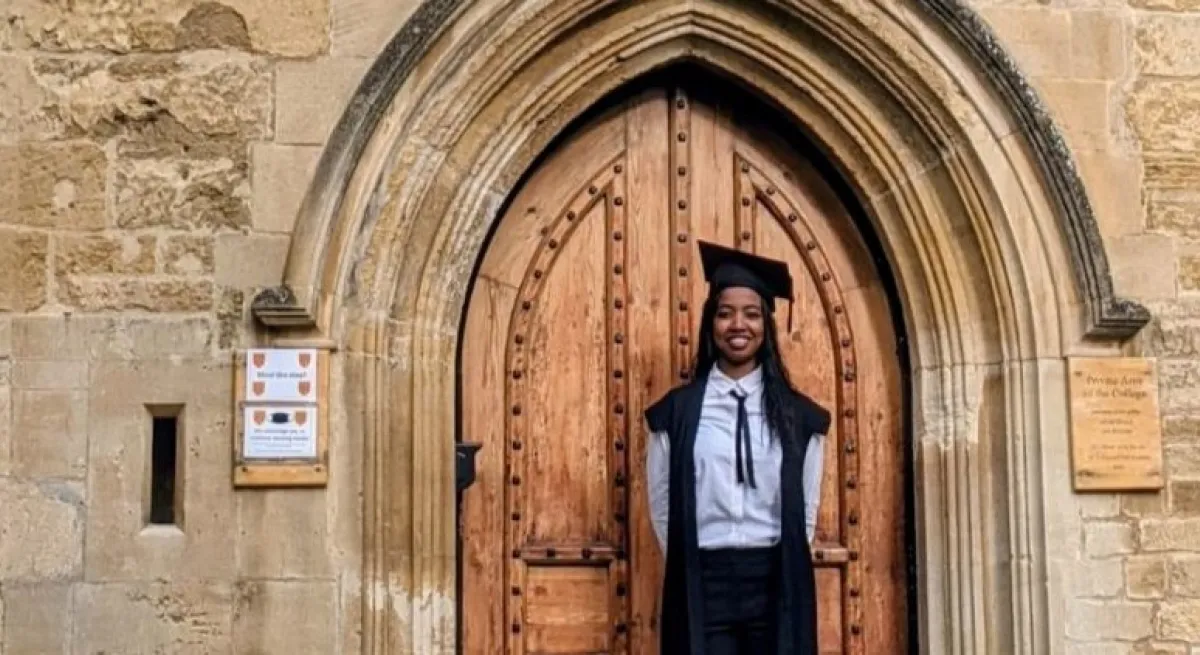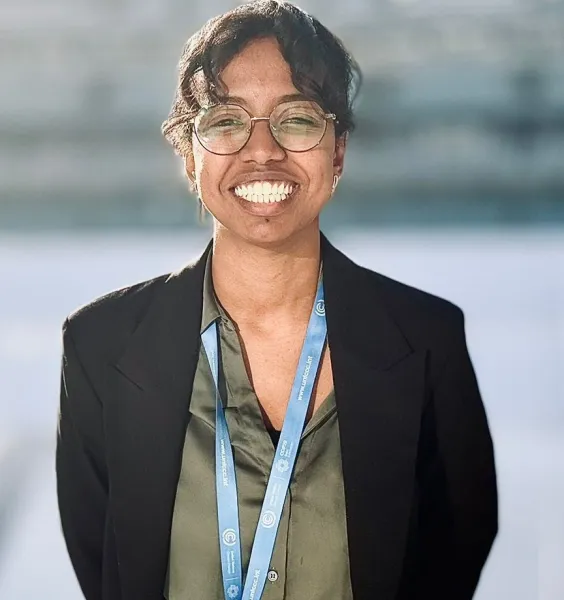Access to quality education plays a significant role in overcoming the barriers to income and opportunity caused by wealth inequality. Access to elite education even more so: Education at a prestigious institution can significantly enhance social mobility by providing access to unparalleled resources, networks, and opportunities that may otherwise be out of reach. Julius Baer, together with the Weidenfeld-Hoffmann Trust, supports postgraduate scholars from developing and emerging countries to pursue fully-funded graduate studies at the University of Oxford alongside a comprehensive programme of leadership development, long-term mentoring and networking. The ultimate objective: Empowering future leaders to create impact and opportunity for their communities and countries.
This series of articles by programme alumni aims to share their views and insights on their experience and how the knowledge and experience they gained at Oxford and beyond has influenced their own world views and equipped them to affect positive change in the social, political or economic development of their community or country.

I grew up in Sudan, a land of sweeping deserts and fertile Nile valleys. My awareness of climate change started at a young age, not as an abstract idea but through the devastating reality of the 2013 floods, which destroyed thousands of homes, schools, lives, and livelihoods. It was deeply perplexing how the Nile, our essential source of life, could also become a source of such profound destruction.
From my early teenage years, I felt compelled to share stories about climate change and its impacts on my community. However, Sudan was under the oppressive regime of the Omar al-Bashir dictatorship, which meant that youth activism and ambition were perceived as threats, making it challenging to openly engage in advocacy. Despite these risks, I continued working alongside a passionate group of young Sudanese activists, raising awareness about climate change and implementing adaptation projects across the country.
“Peace, Freedom, Justice!”
6 April 2019 was a life-changing day for me. I still vividly recall the electricity in the air as I joined thousands of Sudanese in the streets of Khartoum demanding change. We chanted “peace, freedom, justice!” until our voices grew hoarse, united in hope that decades of authoritarian rule would finally end. After months of relentless protests across Sudan, what once seemed impossible happened: President al-Bashir, who had held power for nearly 30 years, was overthrown.
That revolution marked a profound turning point in my life. Standing shoulder-to-shoulder with people from all walks of life – young and old, urban and rural – I felt the transformative power of collective action. We were reclaiming our future. Inspired by this experience, I deepened my involvement with pro-democracy groups and youth-led climate advocacy, recognising that political freedom and climate justice are deeply interconnected.
This realisation became a driving force, motivating me to apply to Oxford to pursue further qualifications in environmental management. My goal at the time was to return to Sudan equipped with the knowledge and skills needed to enhance our nation’s adaptation and resilience in the face of the climate crisis.
From Khartoum to Oxford
Leaving Sudan to study at the University of Oxford was both exhilarating and daunting. When I learned I had been selected as a Weidenfeld-Hoffmann Trust scholar, supported by Julius Baer, it felt surreal. This scholarship made my dream of pursuing an MSc in Environmental Change and Management possible by covering all expenses, removing the financial barrier that would otherwise have made studying at Oxford unattainable. For someone from Sudan, an Oxford education had always seemed like a distant, unreachable dream, and now it had become a reality.
I arrived at St Edmund Hall in late 2021 with a profound sense of gratitude mixed with a persistent feeling of imposter syndrome. Although excited and motivated, I couldn't help but wonder if I truly belonged in such an esteemed institution. Determined to honour this remarkable opportunity, I resolved to embrace every moment, pushing beyond my comfort zone and proving to myself that I deserved this place.
For someone from Sudan, an Oxford education had always seemed like a distant, unreachable dream, and now it had become a reality.
Oxford greeted me with its centuries-old colleges, the elegant Latin grace recited at formal dinners and libraries overflowing with history and knowledge. In my first week, as I explored the University grounds and visited more colleges, I was filled with awe and also unease. The weight of history and privilege here was greater than I imagined, reminding me of how rare my presence was in these halls. As I met classmates, many of whom had attended prestigious universities, I realised how different my journey had been. Some of my peers had never encountered someone who had grown up amid economic sanctions, political turmoil and societal unrest.
I soon realised I was among very few Sudanese students at Oxford, representing experiences and perspectives rarely heard in these historic classrooms. I knew I carried Sudan's stories, its resilience, struggles and hopes, and felt deeply responsible for sharing them authentically. I recognised that my presence here was not only about personal growth; it was an opportunity to build bridges, to foster mutual understanding and to ensure that Sudan’s voice was represented in global conversations on climate and development.
Privilege and Perspective at Oxford
Studying at Oxford opened doors to resources and opportunities I had only previously imagined. Immersing myself in rigorous courses on climate science, environmental policy, and sustainable development, I gained new insights and theoretical frameworks to understand climate change. Yet, beyond the academic knowledge, it was the moments when theory met real-life experiences that truly resonated.
I remember a class discussion on climate justice. The professor encouraged us to think about how climate impacts differ across communities and geographies. In that conversation, I shared the story of Sudan's devastating floods in 2020, which had displaced nearly 850,000 people. As I described the scenes of families losing homes, the urgent scramble for resources, and the widespread suffering amplified by limited adaptive capacity, I saw my classmates' faces shift from academic curiosity to empathy. Turning abstract concepts into deeply human realities. It was in moments like these that I fully grasped how my unique perspective as a Sudanese student enriched discussions at Oxford, contributing an essential dimension often absent from climate dialogues at elite institutions.e.
It was in moments like these that I fully grasped how my unique perspective as a Sudanese student enriched discussions at Oxford, contributing an essential dimension often absent from climate dialogues at elite institutions.
There were moments I felt like an outsider, aware of Oxford’s legacy as an institution built on privilege and exclusion. Yet change was underway. The university was beginning to confront its past and open space for more diverse voices. My scholarship cohort reflected that shift, students from across the globe, each bringing unique cultures and perspectives. Together, we were helping to redefine what it means to belong at one of the world’s oldest universities.
From the Classroom to Global Climate Stages
Even as I studied, I continued my work as climate negotiator for Sudan at the COP conferences. In November 2021, just weeks after a military coup in Sudan erased much of the revolution’s progress, I represented my country as a negotiator at COP26 in Glasgow. Balancing Oxford coursework with nightly negotiations on climate adaptation finance, I advocated for vulnerable nations, including my own, ensuring our voices were heard on the global stage.
Although political turmoil prevented my immediate return to Sudan after graduation, I was able to secure a role at the International Institute for Environment and Development (IIED). At IIED, I now provide policy advice and technical support at UN climate negotiations, striving to ensure that COP outcomes address the urgent needs of Least Developed Countries (LDCs), including Sudan.

The Power of Access
None of this journey would have been possible without the scholarship supported by Julius Baer. Beyond financial aid, this scholarship symbolised a profound belief in my potential and provided a bridge to global opportunities. My Oxford experience has equipped me not only with education but also with a network committed to meaningful change.
We need to create more pathways like this for talented minds everywhere. In communities across the Global South, there are countless individuals with the brilliance and determination to lead scientific breakthroughs, shape just climate policies, or build lasting peace, if only they are given the opportunity. Too often, their potential goes unrealised, not because of a lack of ability, but because of structural barriers that limit access to quality education and global platforms. Institutions like Oxford possess immense resources and influence; when they open their doors wider and commit to genuine inclusion, they don’t just extend opportunity, they gain in return. They benefit from a richer intellectual environment, more diverse problem-solving approaches and a deeper connection to the realities facing the wider world. Inclusion strengthens institutions. Expanding access isn't charity, it’s a necessary step toward a more equitable and innovative world.
Ultimately, my journey from the protests of Sudan to the halls of Oxford has taught me that talent is universal, but opportunity is not. Scholarships like the one supported by Julius Baer help bridge that gap. They enable students like me to turn personal aspirations into global impact. I hope my story inspires more efforts to democratise education, so that one day a girl from Khartoum attending Oxford won’t be a remarkable exception, but simply a norm in a world where knowledge and opportunity are shared.

Lina works in London as a researcher for the International Institute for Environment and Development (IIED). In this role she supports the Least Developed Countries (LDC) Group at the UN Climate Negotiations, providing technical advice on climate adaptation negotiations. She works closely with LDC negotiators and ministers to ensure their positions are research-based and reflect the needs of vulnerable countries. Lina holds a BEng in Chemical Engineering from the University of Khartoum and a Master’s in Environmental Change and Management. As a 2021-2022 WHT Julius Baer scholar, she blends diplomacy and technical advocacy to advance ambitious and equitable climate action.
